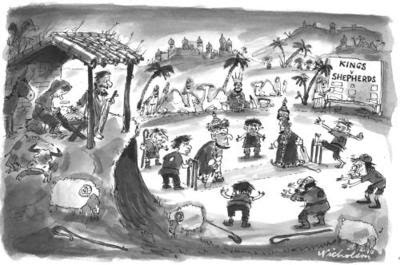

|
Poetry and romance are as plentiful as ever in the world except for those phlegmatic natures who I suspect would in any age have regarded them as a dull form of erroneous thinking. They exist very easily in the same room with the microscope and even in railway carriages: what banishes them in the vacuum in gentlemen and lady passengers. How should all the apparatus of heaven and earth, from the farthest firmament to the tender bosom of the mother who nourished us, make poetry for a mind that had no movements of awe and tenderness, no sense of fellowship which thrills from the near to the distant, and back again from the distant to the near? — George Eliot |
3 December 2012
|
|
Work of a god I work without cease to make all things perfect. —Siva |
4 December 2012
|
|
How to get the economy moving: Iceland’s example Imprison the bankers. Bail out the people. This is the opposite of what was done in the US and Europe. A funny thing happened on the way to economic Armageddon: Iceland’s very desperation made conventional behavior impossible, freeing the nation to break the rules. Where everyone else bailed out the bankers and made the public pay the price, Iceland let the banks go bust and actually expanded its social safety net. Where everyone else was fixated on trying to placate international investors, Iceland imposed temporary controls on the movement of capital to give itself room to maneuver. — Paul Krugman Iceland told the banks to pound sand. And Iceland’s economy is doing much better than virtually all of the countries which have let the banks push them around. In summary of the Icelandic revolution: |
5 December 2012
|
|
Practical Mysticism The relation of this universe to the world of fact is not unlike the relation between a tapestry picture and the scene which it imitates. You, practical man, are obliged to weave your image of the outer world upon the hard warp of your own mentality; which perpetually imposes its own convention, and checks the free representation of life. As a tapestry picture, however various and full of meaning, is ultimately reducible to little squares; so the world of common sense is ultimately reducible to a series of static elements conditioned by the machinery of the brain. Subtle curves, swift movement, delicate gradation, that machinery cannot represent. It leaves them out. From the countless suggestions, the tangle of many-coloured wools which the real world presents to you, you snatch one here and there. Of these you weave together those which are the most useful, the most obvious, the most often repeated: which make a tidy and coherent pattern when seen on the right side. Shut up with this symbolic picture, you soon drop into the habit of behaving to it as though it were not a representation but a thing. On it you fix your attention; with it you “unite.” Yet, did you look at the wrong side, at the many short ends, the clumsy joins and patches, this simple philosophy might be disturbed. You would be forced to acknowledge the conventional character of the picture you have made so cleverly, the wholesale waste of material involved in the weaving of it: for only a few amongst the wealth of impressions we receive are seized and incorporated into our picture of the world. Further, it might occur to you that a slight alteration in the rhythm of the senses would place at your disposal a complete new range of material; opening your eyes and ears to sounds, colours, and movements now inaudible and invisible, removing from your universe those which you now regard as part of the established order of things. Even the strands which you have made use of might have been combined in some other way; with disastrous results to the “world of common sense,” yet without any diminution of their own reality. — Evelyn Underhill, born this day in 1875 Theophany Deep cradled in the fringed mow to lie |
6 December 2012
|
|
Life did not take over the globe by combat, but by networking. In the first two billion years of life on Earth, bacteria – the only inhabitants – continuously transformed the planet’s surface and atmosphere and invented all life’s essential, miniaturized chemical systems. Their ancient biotechnology led to fermentation, photosynthesis, oxygen breathing, and the fixation of atmospheric nitrogen into proteins. It also led to worldwide crises of bacterial population expansion, starvation, and pollution – long before the dawn of larger forms of life. Bacteria survived these crises because of special abilities that other life forms lack and that add whole new dimensions to the dynamics of evolution. First, bacteria routinely transfer their genes to bacteria very different from themselves. The receiving bacterium can use the visiting, accessory DNA (the cell’s genetic material) to perform functions that its own genes cannot mandate. Bacteria can exchange genes quickly and reversibly. Unlike other life forms, all the world’s bacteria have access to a single gene pool and hence to the chemical prowess of the entire bacterial kingdom. |
7 December 2012
|
|
Full of surprises and contrasts Listen to the Scherzo from Symphony #2 of Jean Sibelius, born this day in 1865 Gennady Rozhdestvensky, Moscow Radio Symphony Orchestra) |
8 December 2012
|
|
Choosing joy in the moment is a habit that can be cultivated. — Josh Mitteldorf |
9 December 2012
|
|
Whoosh... He was in a state of quiet, almost passive enjoyment. All at once, without warning of any kind, he found himself wrapped around, it seemed, by a flame-colored cloud. For an instant he thought of fire, some sudden conflagration in the great city; the next he knew that the light was within himself. Directly afterwards came upon him a sense of exultation, of immense joyousness, accompanied or immediately followed by an intellectual illumination quite impossible to describe. Into his brain streamed one momentary lightning flash of the Brahmic Splendor which has ever since lightened his life; upon his heart fell one drop of Brahmic Bliss, leaving thenceforward for always an aftertaste of heaven. Among other things he did not come to believe, he saw and knew that the Cosmos is not dead matter but a living Presence, that the soul of man is immortal, that the universe is so built and ordered that without any peradventure, all things work together for the good of each and all, that the foundation principle of the world is what we call love and that the happiness of everyone is, in the long run, absolutely certain. — from Cosmic Consciousness, by Maurice Bucke |
10 December 2012
|
|
Active Imagination Active Imagination is a Jungian practice that embodies this richness and openness to symbolic possibility. It’s a form of imaginative storytelling used to enter into a dialogue with the unconscious. You center a session around an initial image or figure (often from a dream or myth) and then leave yourself open to how it evolves, and to the related images and figures that drift into consciousness. A session might start with you shutting your eyes (or not), and waiting for a mental image to appear. Perhaps you see yourself walking in a forest. And then you let it unfold, so that perhaps you follow a winding path between the trees, and in the distance you see a hunched figure, and you follow and you try to get closer but the figure keep shuffling away, and you see it turn off the path and enter a house, and you follow it into the house, and it turns out to be an old woman who has laid out a plate of bread and cheese for you. And you start to talk to her. And so on and so forth. It’s a meditative process, one where you bracket out the discursive mind and try to simply let yourself be lead along by your imaginings. It’s a bit like an interactive process of free association... — from a 3Quarks article on Karl Jung |
11 December 2012
|
|
To the Stars Roll on, ye starts! exult in youthful prime, — Erasmus Darwin, born this day in 1731 |
12 December 2012
|
|
“Never look down to test the ground before taking your next step; only he who keeps his eye fixed on the far horizon will find the right road.” — Dag Hammarskjold |
13 December 2012
|
|
Ravi Shankar, 1920-2012 I was a college freshman in 1967 when my father bought me the album West Meets East, a collaboration of classical violinist Yehudi Menuhin with Indian virtuoso Ravi Shankar. My father had had an acquaintance with Menuhin, and had known his reputation as a child prodigy. But to both of us, the Indian sitar was a foreign language. We could sense the disciplined training, the spontaneous genius of improvisation, and the infallible ears that these two must have had in order to immitate one another. And we knew that much of the music was lost on us because we were did not know the language. I still have not learned the language, and can appreciate this music only on the surface. For now, I’ll savor the music’s mystery. Here is my favorite cut from the West Meets East album, with melodies I recall 45 years later. |
14 December 2012
|
|
As humans, we can have many different reasons for why we act the way we do. Our motivations might include compassion, greed, altruism, fear, ambition, lust, creativity, revenge, or a million other feelings. In essence, though, from a Soul level, the only real issues we face are our ability to open to love and find our unique expression of that love in the unity of Truth. Everything else is ultimately a distraction from our Soul’s purpose—to know love in the deepest sense. This means that our Soul’s work is to uncover and bring into conscious awareness the obstacles to our heart, in order to achieve the fullest expression of who we are. This is the purpose of life and of all the experiences we have. Such obstructions to our heart might include, for example, needless fear, shame, or ignorant beliefs that we might hold onto. Such feelings or beliefs will continue to have power over us until they can be brought into the light of day — i.e., into our conscious awareness—where we can then fully recognize their limitations. When we can become truly aware of an obstacle to our heart, it will naturally lessen in its power over us and eventually dissolve. This is because we are nothing other than love in our essence. Love is our truest authority. The more that we allow ourselves to feel love — for ourselves, for others, for the Divine — and the more that we allow ourselves to be loved, the more that we come into harmony with the music of our Soul. — from Inner Source Healing |
15 December 2012
|
|
Happy Birthday, Ludwig Here is a movement from young Beethoven’s soft and sensitive side. |
16 December 2012
|
|
Advice for a Young Writer Doubt reigning ideologies and the princes. Be careful not to contaminate your speech with the language of ideologies. Believe that you are mightier than the generals, but do not measure your strength with them. Do not believe in Utopian projects, except in those you are creating yourself. Be equally bitter towards the princes as you are towards the crowds. Have a clear conscience regarding the privileges that your writer’s trade provides. Do not mix the curse of your profession with class oppression. Do not believe in statistics, in numbers, in public statements: reality is that which cannot be seen with the naked eye. Do not practice economics, sociology, psychoanalysis. Be aware that fantasy is fabrication’s sister, and therefore dangerous. Do not be the opposition, for you stand not across the princess, you are down below. For you, your words cost you nothing. Do not be on a mission. ...lots more. |
17 December 2012
|
|
Rescuing a cancer drug from the economic orphanhood The drug called Gleevec showed great promise for treating chronic myeloid leukemia (CML) but executive management at Novartis did the numbers and decided there just weren’t enough patients with the disease to warrant an investment in clinical trials. Brian Druker, a researcher at Univ of Washington, had a different perspective. He worked on his own dime, applied for funding from Howard Hughes Foundation, and pestered Novartis management until they relented. Gleevec turned out to be almost miraculously effective, offering new lives to many, many very sick people who received it in experimental trials. Later it was found to be effective for 9 other cancers as well, and today, it is treatment for 200,000 patients around the world. — Read an interview with Dr Druker from the NYTimes |
18 December 2012
|
|
With all its suffering and triumphs You can’t selectively numb feelings. If you numb yourself to push aside feelings of grief, then joy disappears with it. When you banish fear and shame, you lose satisfaction, fulfillment and pride. |
19 December 2012
|
|
Is today the last day of the world? A philosophy is characterized more by its formulation of problems than by its solution to them... If we would have new knowledge, we must get a whole new set of questions. — Susanne K Langer, born this day in 1895 ...so Susanne, the question is, ‘What questions should we be asking? |
20 December 2012
|
|
Teach your dog to play the piano Here’s how!
|
21 December 2012
|
|
Credo I cannot find my way: there is no star No, there is not a glimmer, nor a call, — Edwin Arlington Robinson, born this day in 1869 |
22 December 2012
|
|
Logic and Intuition Choose your beliefs consciously, awarely, actively, with explicit attention to logical consistency and the reliability of your sources. Meticulous analysis is in order, with ongoing cycles of correction. Make decisions intuitively, without imposing a formal logic. Listen to your subconscious, removing yourself at arms’ length, patiently watching the process without taking sides, allowing thoughts, fantasies and intuitions their full scope, until a natural and satisfying conclusion settles within you. — Josh Mitteldorf |
23 December 2012
|
|
We can neither ignore nor respect infinity If this world is not to our taste, well, at all events there is Heaven, Hell, Annihilation – one or other of those large things, that huge scenic background of stars, fires, blue or black air. All heroic endeavour, and all that is known as art, assumes that there is such a background, just as all practical endeavour, when the world is to our taste, assumes that the world is all. But in the twilight of the double vision, a spiritual muddledom is set up for which no high-sounding words can be found; we can neither act nor refrain from action, we can neither ignore nor respect Infinity. — E M Forster |
24 December 2012
|
|
For secularists, Dec 25 is Newton Day Everybody at the time accepted Aristotle’s description of how physics works. Not only did it have the sanction of 2,000 years, but it made so much sense, and the idea was elegant and simple and beautiful. For Newton to imagine that there could be a better description of nature, he first had to embrace Descartes’s notion that empirical validation is a higher standard of truth than beauty and simplicity. Then he had to do the experiments. Then, in order to make sense of them, he invented a new branch of mathematics.‘’ “” “Newton was a difficult man, prone to depression and often involved in bitter arguments with other scientists...” — Isaac Newton, born this day in 1672 |
25 December 2012
|
|
Boxing Day The day after Christmas is traditionally a time for generosity and charity.&nbps; The exact etymology of the term "boxing" is unclear. There are several competing theories, none of which is definitive. The European tradition, which has long included giving money and other gifts to those who were needy and in service positions, has been dated to the Middle Ages, but the exact origin is unknown. It may come from a custom in the late Roman/early Christian era, wherein metal boxes placed outside churches were used to collect special offerings tied to the Feast of Saint Stephen, which in the Western Church falls on the same day as Boxing Day. |
26 December 2012
|
|
‘It is a part of probability that many improbable things will happen.’ — Agathon Agathon (Greek: Ἀγάθων) (ca. 448–400 BC) was an Athenian tragic poet, all of whose works have been lost. He is best known for his appearance in Plato’s Symposium, which describes the banquet given to celebrate his obtaining a prize for his first tragedy at the Lenaia in 416. He is also a prominent character in Aristophanes’ comedy the Thesmophoriazusae. The source of this quote is Aristotle’s Poetics. I came across the quote from Aristotle, quoting Agathon in turn, in an epigraph to Chapter 41 of Daniel Deronda by George Eliot. |
27 December 2012
|
|
I can’t believe it’s not Bach This music is all about exultation — light, exuberant and ecstatic. The joke is that it’s so hard to sing that few choirs can pull it off in this spirit. I think Helmuth Rilling and the Gächinger Kantorei from Stuttgart succeed admirably. This Bach Motet is performed less than others, presumably because it has been determined to be an adaptation from Telemann and not a Bach original — certainly not because it is less deep or musically interesting. Listen to the motet Jauchzet dem Herrn For my taste, the interpretation of Nikolaus Harnoncourt is even more light-hearted and transparently virtuosic. He has not recorded the apocryphal Jauchzet, but here is a version of an even more complex and demanding Bach motet, Lobet dem Herrn |
28 December 2012
|
|
The chaos of creation 30 Doradus is another vast star-forming factory, and this image is Hubble’s view of it. You’d never guess it’s located about 170,000 light years away, 25 times the distance to the Carina Nebula! 30 Dor is one of the largest stellar nurseries known, with some estimates of it having more than 100,000 stars inside. It’s ridiculously complex, as you can tell if you get the 4,000 x 3,000 pixel image, and most certainly if you get the monster 20,000 x 16,000 pixel one. That one will keep you busy for a long time; you’ll see stars being born, stars dying, shock waves compressing material into filaments, and just crazy beauty everywhere you look. I seriously can’t recommend enough you explore it. |
29 December 2012 |
|
What would it mean to live forever? We are finite creatures. All our experimental apparati are finite. Empirically, there is no such thing as “infinity”, but only a human-scaled limit for our ability to measure or calculate. Does space go on infinitely in all directions, or is it merely larger than anything that we can measure? Mathematically, this may be a question we wish to ask, but scientifically it is not meaningful because it is not a question to which we can assign any empirical meaning. Similarly, there is a mathematical meaning, but no physical meaning to the concepteternity. We may wish for eternal life, but we cannot conceive eternity. Homo sapiens has been on earth for a mere 200,000 years, and even that is so far beyond our experience as to be an abstraction to us. We like to think of “getting death out of the picture”, so we need never worry about dying. Think of it as a lifetime so long that, in practice, you just don’t worry about its limits. But don’t think about eternity – the very idea is full of paradoxes. Start with the fact that you have a finite brain with finite memory capacity. Eventually, it would all get used up... |
30 December 2012
|
|
To the New Year With what stillness at last so this is the sound of you — W. S. Merwin |
31 December 2012 |























